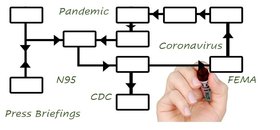Biden Has a Congressional Shortcut to Cancel Trump's Regulatory Rollbacks, but It Comes with Risks

The Trump administration dedicated itself to deregulation with unprecedented fervor. It rolled back scores of regulations across government agencies, including more than 80 environmental rules. The Biden administration can reverse some of those actions quickly – for instance, as president, Joe Biden can undo Donald Trump’s executive orders with a stroke of the pen. He plans to restore U.S. involvement in the Paris climate agreement that way on his first day in office. Undoing most regulatory rollbacks, however, will require a review process that can take years, often followed by further delays during litigation. There is an alternative, but it comes with risks.
Read PDF
Author(s): Daniel Farber
Joint Letter to Incoming Biden-Harris Administration on Regulatory Process Reform

CPR joined the Coalition for Sensible Safeguards and 94 other organizations in calling on the incoming Biden-Harris administration to direct the White House Office of Information and Regulatory Affairs (OIRA) to take on the mission of advancing a strong, proactive agenda for safeguarding the public, workers, and the environment. The groups offered a set of recommendations to help ensure that our regulatory system protects workers, consumers, our environment, and our economy.
Read PDF
Center for Progressive Reform Launches New Initiative to Create a More Just, Sustainable America

The Center for Progressive Reform launched Policy for a Just America today, a major new initiative to use the tools of democracy to advance justice and equity, protect public and environmental health, and create a more sustainable future. The Trump administration has waged a sustained assault on our democracy and rolled back decades’ worth of health, safety, and environmental protections over the last four years. CPR’s Policy for a Just America aims not only to repair the damage but also to reimagine and rebuild our government so that it works for all people, not just the wealthy and powerful few.
Read PDF Read Online
Author(s): Brian Gumm
Tainted Tap: Nitrate Pollution, Factory Farms, and Drinking Water in Maryland and Beyond

CPR's close look at nitrate pollution in drinking water on Maryland's Eastern Shore raises serious safety concerns. According to county data in the region, tens of thousands of residents are drinking water with elevated nitrate levels, almost certainly due to animal waste from concentrated animal feeding operations (CAFOs) nearby. Moreover, the state's lax requirements for well water testing makes it impossible to know just how widespread the problem is.
Read PDF Read Online
Author(s): Katlyn Schmitt, Darya Minovi
Justice Ruth Bader Ginsburg: Reflections and Remembrances

CPR's Member Scholars and staff reflect on the life and work of Supreme Court Justice Ruth Bader Ginsburg.
Read Online
Her Black Coffee Always Brewed Strong

CPR's Gillian Metzger, joins fellow Ruth Bader Ginsburg former clerk Abbe Gluck in a New York Times tribute to the late Supreme Court Justice.
Read PDF
Author(s): Gillian Metzger
Joint letter opposing federal liability shield during COVID-19

In July 2020, a group of 136 law professors from across the United States, including 31 Center for Progressive Reform (CPR) Member Scholars, wrote to congressional leaders urging them to “ensure that our courthouse doors remain open to all Americans for injuries they suffer from negligence during the COVID-19 pandemic.”
Read PDF
Ellison extends a proud history: Holding ExxonMobil and Koch accountable

Writing in MinnPost, Alexandra Klass applauds the effort to hold major corporate contributors to climate change accountable by means of a consumer protection lawsuit against ExxonMobil, Koch Industries, and the American Petroleum Institute. The suit seeks restitution and penalties for the harm to Minnesotans from the industry's decades-long effort to mislead the public about climate change and its origins.
Read PDF
Author(s): Alexandra Klass
The Seila Law Case: Liberty and Political Firing

David Driesen, writing in The Hill, discusses the implications of the Supreme Court's decision in the Seila Law case, over President Trump's firing of the head of the Consumer Financial Protection Bureau for political reasons. Driesen writes, "Astonishingly, Chief Justice John Roberts’s majority opinion associates the president’s ability to use political firing to instill fear in government employees with the preservation of liberty."
Read PDF
Author(s): David Driesen
The Trump Administration’s Pandemic Response is Structured to Fail

Writing for the Regulatory Review, CPR Member Scholars Alejandro Camacho and Robert Glicksman describe the structural failings of the Trump administration's response to the coronavirus pandemic.
Read PDF
Author(s): Alejandro Camacho, Robert Glicksman
